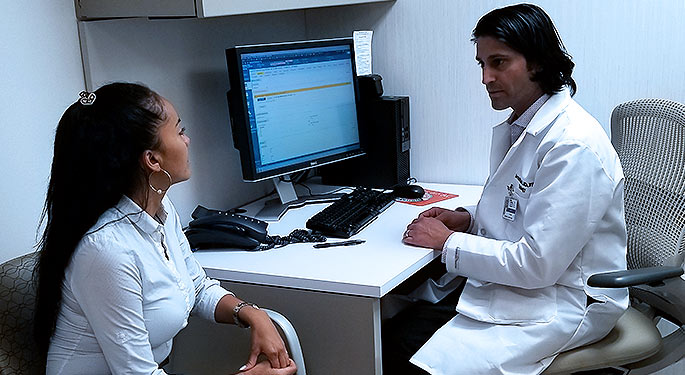Female Urology at Mount Sinai

We pride ourselves on our advanced, comprehensive care in female urology. We deliver treatments for conditions such as overactive bladder, urinary incontinence, pelvic organ prolapse, and other ailments impacting women’s urinary and sexual health. By merging state-of-the-art diagnostics and contemporary surgical methods, our dedicated team at Mount Sinai ensures you receive cutting-edge care and the personal touch you deserve.
Conditions We Treat
Our care begins with a detailed patient consultation to hear your symptoms and concerns. We ensure accurate diagnoses using the latest diagnostic tools—from urodynamic testing to cystoscopy and radiographic imaging.
Our board-certified professionals have expertise in treating an array of female urology conditions, such as:
- Pelvic Organ Prolapse, which happens when the tissue around the vagina weakens, making the bladder and, or, uterus to drop into the vagina causing a bulge. Childbirth, age, and hormonal shifts are common culprits.
- Stress Urinary Incontinence (SUI), the leakage of urine with any activity. This can happen with coughing, sneezing, laughing, exercise, or even during sexual activity.
- Overactive Bladder (OAB): The general description for when someone uses the bathroom very frequently or may have a sudden need to urinate that is difficult to hold off. Some people may leak urine because they are not able to reach the bathroom in time.
- Female Sexual Dysfunction (FSD): We use a detailed approach to treating FSD that includes issues of low desire, arousal, orgasm, and dyspareunia (pain with sexual intercourse) with surgical options, medication, and behavioral strategies, in collaboration with other specialties for comprehensive care.
- Interstitial Cystitis (IC)/Bladder Pain Syndrome: A chronic condition (lasting more than six months) leading to bladder discomfort and frequent urination.
- Genitourinary Syndrome of Menopause: A collection of symptoms and signs caused by hypoestrogenic (low estrogen) changes to the female genital organs, urethra, and bladder that occurs in menopausal patients and sometimes as a side effect of medications in patients of reproductive age.
Treatments
Our treatment philosophy hinges on patient autonomy through education. We collaborate with you to determine the most appropriate treatment path for your condition, lifestyle, and preferences.
Treatment options can include:
- Pelvic Floor Rehabilitation: Focuses on improving pelvic muscle function through biofeedback and electrical stimulation to alleviate symptoms by adjusting muscle strength (helping one to relax or tighten certain muscles), flexibility, and coordination.
- Urethral Sling Surgery: A procedure to support the urethra to treat SUI.
- Urethral Bulking: A procedure where we inject material around the walls of the urethra to help it close better. It is a treatment for SUI.
- Bladder Botox: An in-office solution for OAB to relax bladder muscles.
- Sacral Nerve Stimulation: A treatment for OAB that provides gentle stimulation to the nerves that communicate between the brain and bladder in the lower back.
- Percutaneous Tibial Nerve Stimulation: A treatment option for OAB that provides gentle stimulation to the nerves near the ankle.
- Vulvovaginal Surgery: Various methods to treat pelvic organ prolapse, genital pain, and sexual dysfunction prioritizing minimal invasiveness and patient comfort.